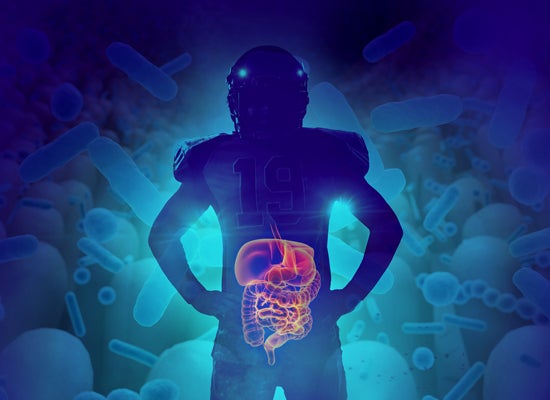Is the Biomarker for Concussion in Our Gut?
Houston Methodist and Rice athletes have teamed up to conduct innovative research in concussion diagnosis.

Spring 2025
By Kayt Sukel
Experts estimate that approximately 10% to 20% of athletes who participate in contact sports, from football to soccer, suffer from head injuries — and many of those players will experience more than one concussion, a type of traumatic brain injury associated with neuroinflammation.
With research demonstrating that concussions are often associated with depression, memory loss and even, in some cases, long-term brain damage, it is imperative for clinicians to be able to quickly identify and treat such injuries. Neuroscientist Sonia Villapol, who leads the lab at the Center for Neuroregeneration at Houston Methodist Research Institute, is searching for a biomarker to do just that. But she is not looking in the brain — she believes that marker likely resides in the microbiome.
The human microbiome is made up of the trillions of microorganisms that naturally live within the gut. It helps facilitate the gut-brain connection, the complex two-way communication system that underlies good health.
In a recent pilot study looking at specific changes in 33 Rice football players, she and her colleagues at the Stanley H. Appel Department of Neurology at Houston Methodist and the Department of Athletics at Rice discovered that four athletes who suffered from a concussion showed significant decreases in two specific gut bacterial species, Eubacterium rectale and Anaerostipes hadrus. Yet, to determine whether such alterations could potentially be used for concussion diagnosis in the future, Villapol and her team wanted to do a larger study — and look at different profiles of athletes.
“We know, from animal studies, that females have different types of neuroinflammation and alterations in the gut microbiome after head injury. It is not the same kind of neuropathy we see in males,” she says. “But we also don’t know the mechanism of how these changes in bacteria may lead to inflammation in the brain. We hypothesize it’s something to do with brain-gut communication, but we need to look at the different metabolites and neurotransmitters to understand how.”
This is a study that’s going to help [Rice student-athletes] long-term health and their professional pursuits after their athletic careers have ended.
She and neuropsychologist Kenneth Podell, director of the Houston Methodist Concussion Center, are now conducting an even larger study, recruiting more than 120 Rice athletes across a variety of sports.They will use more advanced techniques to look at how the gut changes over the course of a year of playing the sport, whether the gut can reestablish its normal makeup after a concussion and whether they can note any specific changes as the result of repetitive hits to the head that do not qualify as concussions. They will also note any differences between male and female athletes and type of sport.
Villapol says understanding microbiome changes may not only provide a new way to diagnose concussion, but also to potentially treat it.
“After doing this kind of sequencing to understand what is changing, I would love to try some interventions with specific probiotics,” she says. “It would be a type of personalized medicine.”
Rice Athletics’ Sarah Schodrof says this study helps Rice’s sports program increase its focus on the greater well-being of student-athletes. “This is a study that’s going to help their long-term health and their professional pursuits after their athletic careers have ended,” she says.
Sonia Villapol is assistant professor of neurosurgery at Houston Methodist Research Institute. Kenneth Podell is director of the Houston Methodist Concussion Center and of the Neuropsychology Section at the Houston Methodist Stanley H. Appel Department of Neurology. Sarah Schodrof is assistant athletic director for medical services and research at Rice Athletics.
